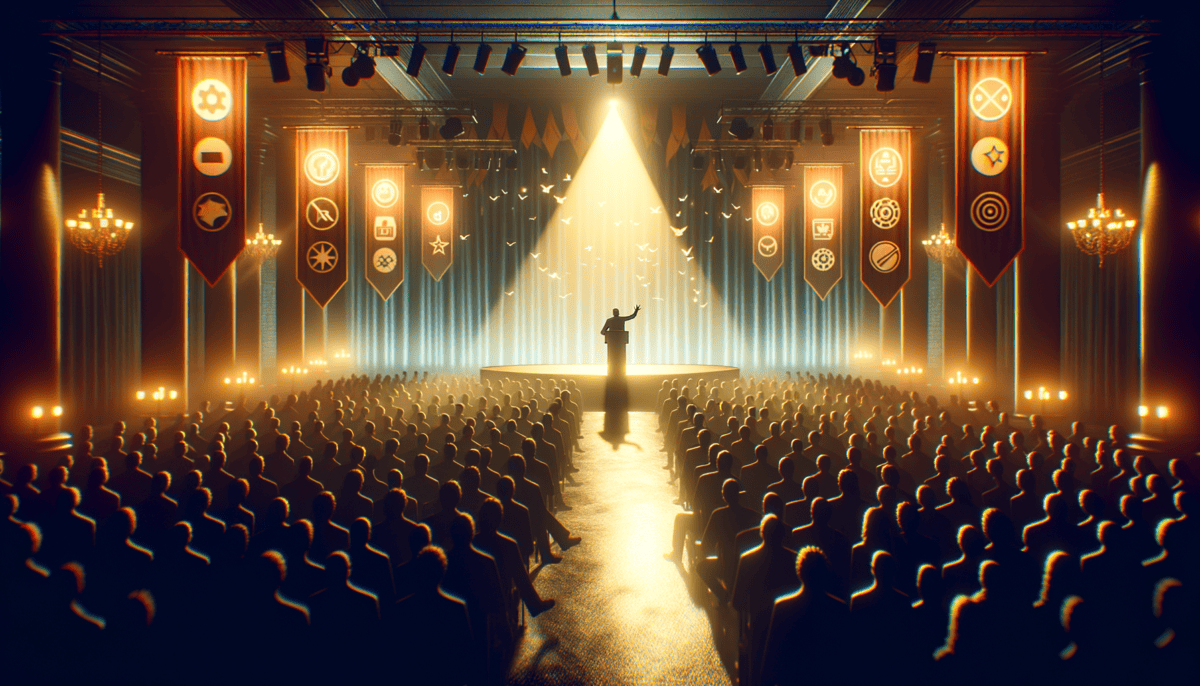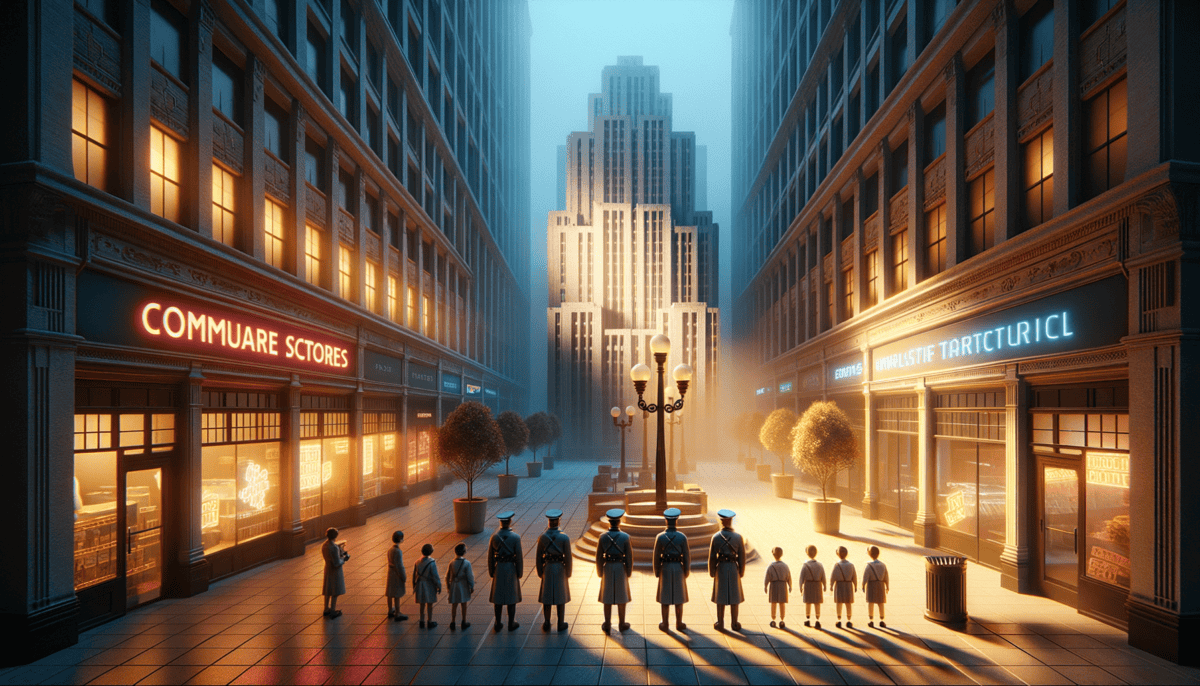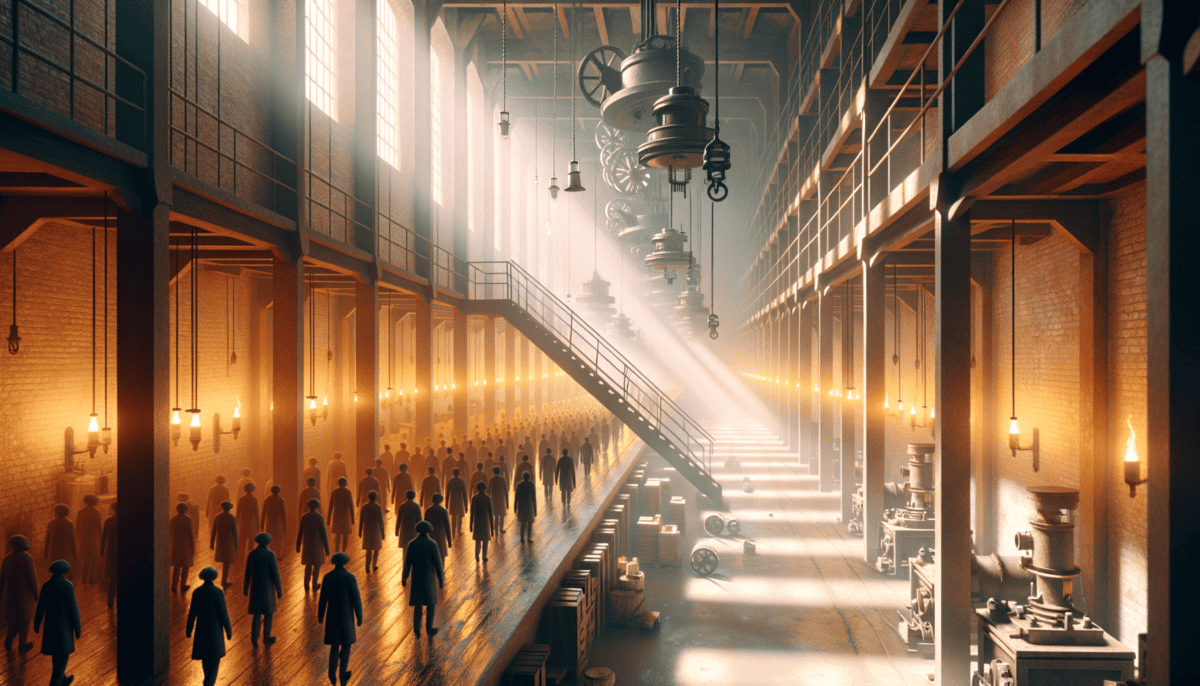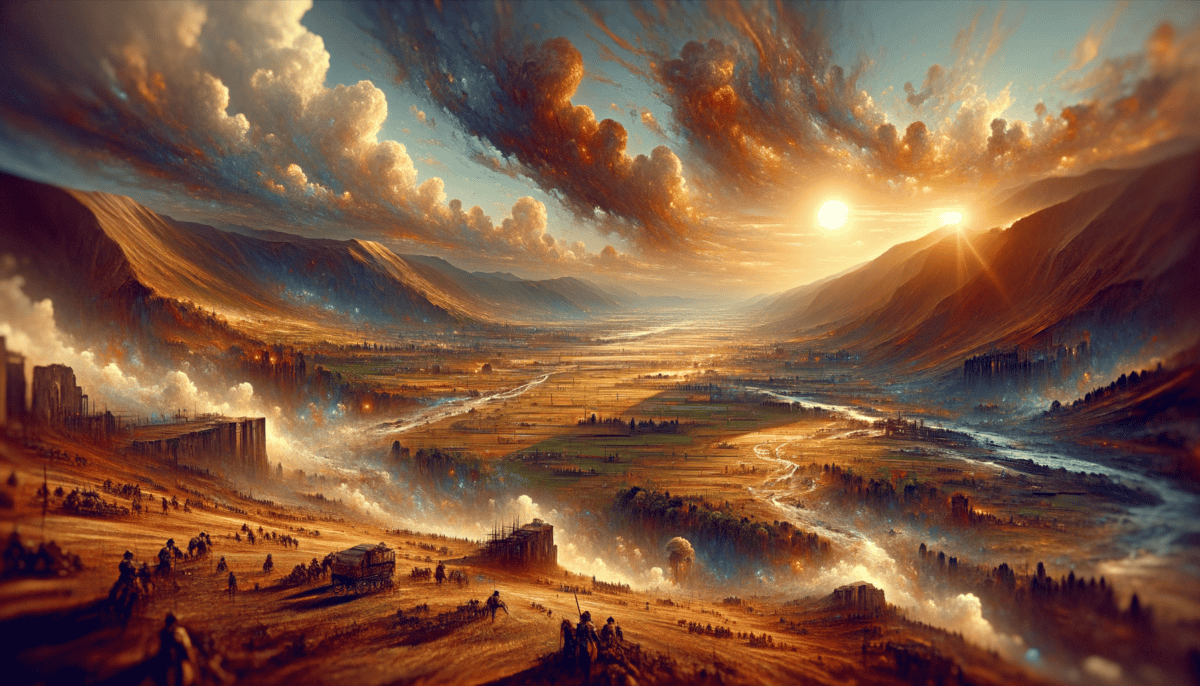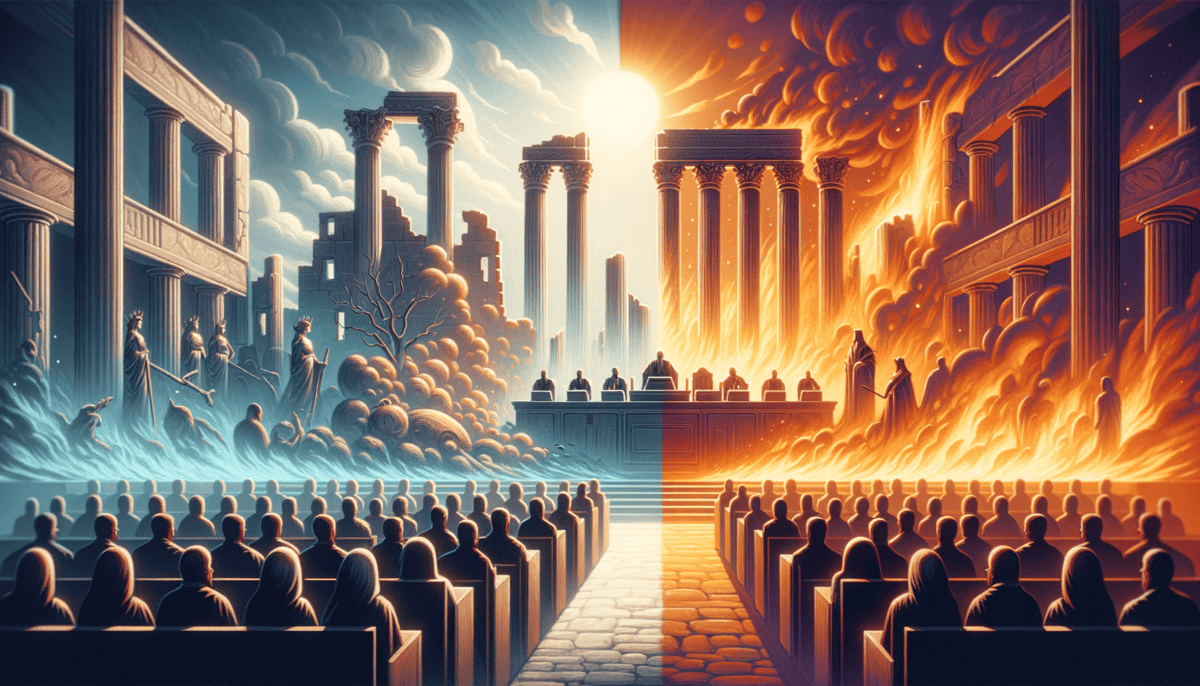Shadows of Defeat
Little Hans peered through the dusty window of his family's small bakery in Munich. The streets outside were filled with sad, hungry people. It was 1919, and Germany had just lost a big war.
"Papa, why are there so many people waiting in line?" Hans asked his father, who was carefully counting their last bits of bread.
"Times are hard, my son," Papa sighed, wiping flour from his worn apron. "Money isn't worth much anymore. People need twenty bags of it just to buy one loaf of bread."
In another part of the city, a young man named Adolf Hitler walked the streets. He had fought in the war and felt angry that Germany had lost. His clothes were dirty, and he didn't have much money. But he had big plans.
"Germany deserves better!" Hitler would shout to anyone who would listen. Some people started to pay attention to him.
“The German people are special,” Hitler would say. “We shouldn’t have to suffer like this!”
Back at the bakery, Hans watched more changes happen. His mother now kept a special book where she wrote down prices:
Monday: One bread = 2,000 marks
Tuesday: One bread = 5,000 marks
Wednesday: One bread = 10,000 marks
"It's like magic money that gets bigger but buys less," Hans said to his little sister Emma.
Meanwhile, Hitler joined a small group called the Nazi Party. He wasn't the leader yet, but he was good at giving speeches. People would gather in big beer halls to hear him talk about making Germany strong again.
Many grown-ups were scared and confused about what was happening to their country. Soldiers who had fought in the war couldn't find jobs. Shops were closing. Children like Hans and Emma didn't always have enough to eat.
"Look at that man on the corner," Emma pointed one day. It was Hitler, standing on a box and speaking to a small crowd. "He talks so loud!"
Their father pulled them away. "Some people think shouting fixes problems," he said quietly. "But it usually just makes more noise."
But more and more people started listening to Hitler. He promised to make things better. He said he knew who was to blame for all their troubles.
At night, Hans would hear his parents talking in worried voices.
"Things are changing," his mother would say.
"Yes," his father would answer. "But not all change is good."
Outside their window, groups of men in brown shirts began marching through the streets. They carried flags with strange symbols. Hitler was no longer just a loud voice on a corner – he was becoming someone important.
The shadows of defeat that hung over Germany were about to turn into something much darker. But in 1919, little Hans couldn't know that yet. He just knew that his stomach was often empty, and the grown-ups seemed scared about tomorrow.
The Path to Power
The year was 1920, and the streets of Munich were buzzing with change. Hitler was no longer just a man shouting on corners – he had become really good at getting people to listen. ️
“Come hear the truth!” men would call out, handing colorful papers to people walking by. These papers had big, bold letters and pictures that caught everyone’s eye.
• Used bright red flags and eye-catching symbols
• Made speeches in big, noisy beer halls
• Put up lots of colorful posters
• Wrote simple messages that were easy to remember
Little Hans watched as more and more people started wearing brown shirts. “Why do they all dress the same, Papa?” he asked one morning.
“They want to look like they’re all part of the same team,” his father explained, kneading dough with worried hands.
“Together we are strong!” the brown-shirts would shout as they marched through streets. Their boots made loud thumping sounds on the cobblestones.
In 1923, Hitler tried something very big and dangerous. He and his followers stormed into a beer hall called the Bürgerbräukeller. They had guns and wanted to take over the government.
This was Hitler’s first try to take power. It didn’t work, and he got in big trouble!
The police stopped Hitler’s plan. He was arrested and sent to jail, but he didn’t stay there very long. While in jail, he wrote a book about his ideas.
Emma, Hans’s sister, noticed things changing too. “The brown-shirts are everywhere now,” she whispered to Hans. “And they’re not very nice to some of our neighbors.”
After Hitler got out of jail, he changed how he tried to get power. Instead of using guns, he decided to use words and votes. He traveled all around Germany, giving speeches in big halls and on radio.
By 1929, something terrible happened. The whole world’s money got sick – people called it the Great Depression. Jobs disappeared, and people got even hungrier than before.
“Now they will listen,” Hitler told his followers. And he was right.
More and more people started believing Hitler’s promises. He said he could fix all of Germany’s problems. He blamed certain groups of people for everything bad that had happened.
“He promises everyone jobs,” Hans heard grown-ups say. “He says he’ll make Germany strong again.”
The Nazi Party grew bigger and bigger. Hitler wasn’t just a loud voice anymore – he was becoming one of the most powerful men in Germany. His picture was everywhere: in newspapers, on posters, even in schoolrooms.
Hans’s father grew quieter with each passing day. One evening, Hans found him staring out the window at a parade of brown-shirts marching by.
“Papa, are you scared?” Hans asked.
His father turned, his face serious. “Sometimes the most dangerous thing isn’t what people do,” he said softly. “It’s what they choose to believe.”
The sun was setting over Munich, casting long shadows across the street. The sound of marching feet echoed through the evening air, growing louder and louder with each passing day.
The Iron Grip
The year was 1933, and Germany was changing faster than ever. Little Hans noticed how the streets felt different now. The brown-shirts weren’t just marching anymore – they were in charge. ️
“Look what’s happening to the other parties,” Emma whispered to Hans one morning. Through their window, they watched as Nazi soldiers closed down offices that belonged to people who didn’t agree with Hitler.
“From now on, there will be only one party in Germany – the Nazi Party!” came the loud announcement over radios across the country.
• Became the leader (they called him “Führer”)
• Made all other political parties illegal
• Took control of newspapers and radio
• Changed schools to teach Nazi ideas
• Made new rules about who could be a German citizen
Hans’s teacher started each morning differently now. “Heil Hitler!” the children had to say, raising their right arms high. Some kids seemed excited, but others, like Hans, felt strange about it.
One day, Hans noticed his friend David wasn’t in class anymore. “Where did David go?” he asked his father.
His father’s face grew sad. “David’s family had to leave, son. The new laws… they’re not kind to Jewish people.”
These were very mean rules that hurt Jewish people and others. They couldn’t do many normal things anymore, like go to certain stores or parks.
Everything started changing. The police weren’t regular police anymore – they were Hitler’s special police. They wore black uniforms and scared everyone.
“Remember,” Emma told Hans, “we must be careful what we say now. The walls have ears.”
“Loyalty to the Führer is loyalty to Germany!” the posters everywhere declared in bold letters.
At school, Hans’s new textbooks were different. They taught that some people were better than others. It didn’t feel right to Hans, but speaking up could get people in trouble.
One evening, Hans saw flames in the city center. Books were burning – lots of them. “Why are they burning books, Papa?”
“Because they’re afraid of different ideas,” his father answered quietly.
The changes kept coming. Boys Hans’s age were told to join the Hitler Youth. They wore uniforms and learned to march. Girls like Emma had to join the League of German Girls.
“We’re building a new Germany!” their leaders would say. But Hans noticed how some of his neighbors disappeared in the night, and no one talked about where they went.
Even the churches changed. Some priests who spoke against Hitler vanished. New priests hung Nazi flags next to crosses.
“Remember,” Hans’s mother would say, “what’s in your heart matters more than what you show outside.”
By 1935, Germany didn’t feel like the same country anymore. Hitler controlled everything – the courts, the schools, the newspapers, even what games children could play.
As night fell over their city, Hans watched brown-shirts marching with torches. Their shadows danced on walls like giant, dark monsters. The Germany he knew was disappearing, replaced by something that made his stomach feel tight with worry.
Darkness Deepens
The summer of 1936 brought heavy changes to Germany. Little Emma watched from her window as trucks rolled through their neighborhood. They weren’t ordinary trucks – they were taking people away.
“Mama, where are they going?” Emma asked, clutching her teddy bear.
Her mother pulled the curtains closed. “Some people have to go to special camps now, sweetheart. We mustn’t ask too many questions.”
“First they came for the others… now they come for anyone who speaks up,” Emma overheard her father whisper late one night.
• Special police watching everyone
• Big fences going up around neighborhoods
• Yellow stars on some people’s clothes
• Children being taught to spy on parents
• Neighbors disappearing at night
At school, Emma’s teacher Mrs. Schmidt was replaced by a stern-faced woman in a black uniform. The new teacher made them sing songs about Hitler every morning.
“Remember children,” she would say, her voice sharp as ice, “good German boys and girls report anyone who speaks against our Führer.”
More camps were being built outside towns. Nobody talked about them, but everyone could see the smoke rising from their chimneys.
Emma’s friend Sarah stopped coming to school. Her whole family vanished one night, their house now empty with a big red X painted on the door.
“Why did Sarah have to go?” Emma asked her mother.
“Because she was Jewish, dear. The new laws say Jewish people must live separately now.”
“But Sarah was my best friend! She didn’t do anything wrong!”
The Hitler Youth became bigger and stronger. Boys marched through streets with drums beating. Girls in white blouses learned to be “proper German maidens.”
One day, Emma saw her neighbor Mr. Klein being pushed into a black car. His crime? Someone heard him tell a joke about Hitler.
The camps grew larger. Trains full of people arrived but never seemed to leave. Nobody spoke about it, but fear hung in the air like thick fog.
“Look away,” parents would tell their children when groups of people were marched through streets.
Emma’s father turned paler each day. “They’re not just prison camps anymore,” he whispered to her mother when they thought Emma was asleep.
“The machinery is getting bigger,” adults would murmur. “The smoke never stops now.”
Young boys who once played with toy cars now wore uniforms and carried real rifles. Girls who used to play with dolls learned to spot “enemies of the state.”
As winter approached, more families disappeared. Empty houses stood like hollow shells, their windows dark and accusing. The streets grew quieter, except for the steady thump of marching boots.
In her diary, Emma wrote: “Dear God, please make the bad things stop. Please bring Sarah back. Please make Germany kind again.”
But the darkness only grew deeper, and the machinery of persecution rolled on, its gears grinding ever faster, consuming more lives with each passing day.
Storm of Steel
The thunder of tanks rattled windows across Poland on September 1, 1939. German soldiers marched forward like a giant wave of gray uniforms. The world was about to change forever. ️
Little Jan watched from his farmhouse as strange planes filled the sky. “Papa, what are those?” he asked, pointing up.
“Those are German planes, son. We must get to the cellar – now!” His father grabbed his hand and ran.
The earth shook as bombs fell. Warsaw, Poland’s beautiful capital city, burned bright against the night sky.
• Tanks rolling through cities
• Planes dropping bombs
• Ships battling at sea
• Soldiers fighting everywhere
• Families running away
Back in Germany, Emma (now twelve) watched more boys leave for war. Her big brother Karl wore a proud smile when he put on his uniform.
“I’ll be home for Christmas, little sister,” Karl promised, ruffling her hair.
But Christmas came and went. Karl’s letters stopped coming. Mother cried at night when she thought no one could hear.
German armies moved like hungry wolves across Europe. They took France, Norway, Denmark, and more.
“Today we march to Moscow!” soldiers sang as they headed east. But Russia was big and cold, and many never came back.
In England, children huddled in underground shelters while German planes dropped bombs on London. The British fought back bravely in their airplanes.
“The sky is full of fire,” wrote a British girl named Mary in her diary. “But we won’t give up.”
Far away in America, President Roosevelt watched and worried. When Japanese planes attacked Pearl Harbor, America joined the fight against Germany.
The war grew bigger and bigger. Battles raged in:
Italy’s mountains
Africa’s deserts
Russia’s snowy fields
The stormy Atlantic Ocean
By 1943, things started going badly for Germany. Russian tanks pushed the German army back. American and British planes dropped bombs on German cities.
Emma’s neighborhood changed. No more proud marches or victory songs. Now there were broken buildings and hungry people.
“Where is our final victory?” people whispered. “What happened to all our soldiers?”
Karl finally wrote home – from a hospital. “The Russians are stronger than we thought,” he wrote. His words sounded tired and sad.
Hitler promised secret weapons would win the war. But the Allied armies kept coming closer. German tanks ran out of fuel. German planes couldn’t fly without gasoline.
Emma wrote in her diary: “The ground shakes every night now. Not from our victory marches, but from bombs. Karl was wrong – he didn’t come home for Christmas. Will this war ever end?”
The mighty German war machine that once seemed unstoppable was beginning to crack. Storm clouds gathered over Berlin as Allied armies closed in from east and west.
The Final Days
Spring 1945 brought dark clouds over Berlin. Emma, now fifteen, helped her mother pack their most precious things. The sound of Russian guns grew louder each day.
“The Reich that was supposed to last 1,000 years is crumbling after just 12,” whispered her neighbor, Mr. Schmidt.
Deep underground in his bunker, Hitler paced like a caged animal. His hands shook as he moved toy armies on maps, but the real armies couldn’t fight anymore. German soldiers were tired, hungry, and running out of hope.
Russian soldiers fought street by street through Berlin
American forces came from the west
British planes flew overhead
German children and old men tried to defend the city
Many people hid in cellars and subway tunnels
Emma’s brother Karl came home at last – not marching proudly, but limping on crutches. His eyes had lost their shine.
“It’s over, little sister,” he said softly. “We were wrong about so many things.”
The fighting stopped on May 7. Emma watched Allied soldiers share chocolate with German children. “Maybe they’re not monsters after all,” she thought.
“The war is over!” people shouted in the streets. Some cried with joy, others with sadness for all they had lost.
Later that year, important trials began in the city of Nuremberg. Nazi leaders had to answer for their terrible crimes. The world learned the full truth about concentration camps and the millions of innocent people killed.
Karl took Emma to see the ruins of Hitler’s grand buildings. “Remember this,” he said. “When people tell you to hate others or claim one group is better than everyone else, think of where that led us.”
Germany would take many years to rebuild. But this time, they would build something different – a country that valued peace and treated all people with respect.
New leaders promised to remember the past and create a better future. German children learned important lessons about treating everyone with kindness.
Years later, Emma told her own children: “We must never forget what happened, but we must also never stop working for peace. That’s how we make sure such dark times never come again.”
Today, people from all over the world visit Germany to learn this important story. Where Nazi flags once flew, there are now museums teaching about peace and understanding. The Third Reich fell, but its lessons remain to help build a better world.


